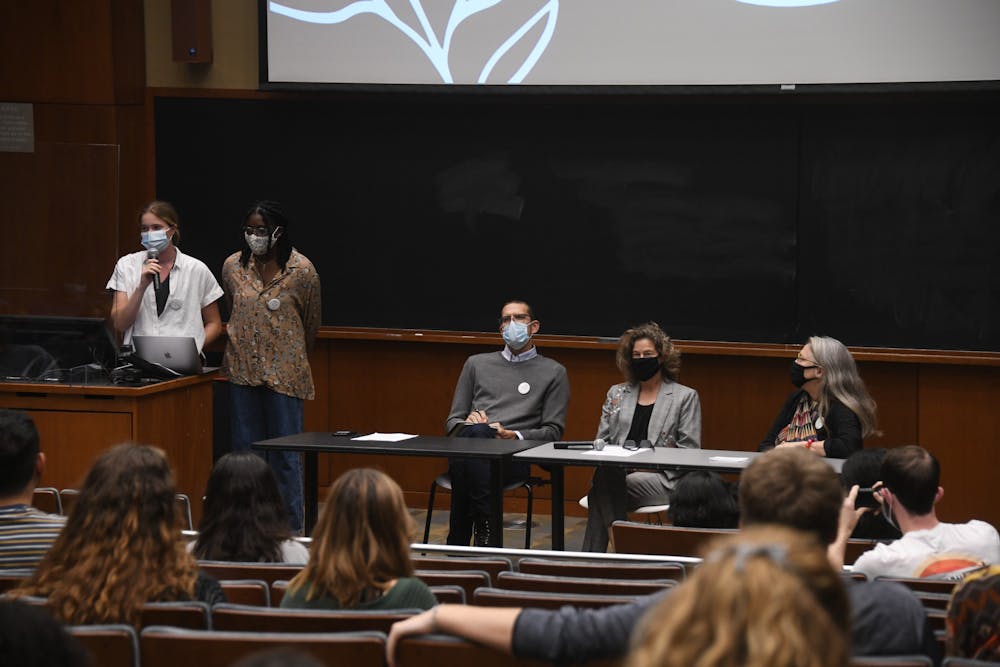Divest U.Va. hosted a political education event pushing the University to withdraw its investments in the fossil fuel industry Thursday at 7 p.m. in Nau Hall 101. The event featured a panel discussion of professors, as well as presentations from student leaders who highlighted the connection between divesting from fossil fuels and environmental justice.
Divest U.Va. is a student organization that advocates for the University to completely remove its investments from fossil fuels. Core organizations making up the coalition also include Young Democratic Socialists at U.Va.’s Ecosocialists, Student Council’s sustainability committee, the Environmental Justice Collective and University Democrats, who are engaging in similar advocacy efforts.
The event follows Divest U.Va.’s release of a petition Oct. 8 outlining demands directed at the University Board of Visitors and the University’s Investment Management Company’s Advisory Committee on Investor Responsibility. The petition underscores the University’s direct contribution to carbon emissions by continuing its investment in the fossil fuel industry and demands that the University completely withdraw funding that supports fossil fuel companies by Dec. 21, 2022.
The event’s faculty panel included Environmental Studies Prof. Deborah Lawrence, Ethics Prof. Willis Jenkins and Architecture Prof. Phoebe Chrisman. The panel began with a discussion of the connection between fossil fuels and environmental justice, highlighting the disproportionate harm of climate change on poor communities and communities of color, both in the U.S. and globally.
Lawrence explained how fossil fuels put carbon dioxide into the atmosphere, thereby “polluting the air” and contributing to climate change — however, they also have a societal effect.
“[Fossil fuels] disproportionately impacts poor and marginalized communities,” Lawrence said. “[There is] a direct connection between fossil fuels and disproportionate impacts.”
Panelists discussed how the impacts of climate change — including rising sea levels, extreme heat and intensifying natural disasters — have more harmful effects for marginalized communities, including poor communities and communities of color, who are less equipped to prepare for and respond to climate-related disasters.
“Adapting to climate change at the individual level, family level, community level, depends on what resources you have,” Jenkins said.
In response to an audience question regarding the importance of endowment disclosure by the University, Jenkins affirmed that there should be transparency in UVICMO’s investments.
“The holding of an endowment that [is] held for common good should be reasonably transparent so that there can be meaningful oversight or at least public comment,” Jenkins said.
The University’s $14.5 billion endowment is a fund composed of philanthropic donations to support University operations. It stands among the 20 largest of all colleges and universities in the U.S. and the fifth largest of public institutions, according to UVIMCO’s 2021 annual report. 10 percent of this endowment is currently invested in “real assets,” which includes fossil fuel companies as well as retail and hospitality companies.
Jenkins suggested the University can learn from its delayed response to its history of being founded and built by the work of enslaved laborers. As the University is only recently beginning to acknowledge this history and think about reparative responses, there is now an opportunity for a more preemptive response against the climate crisis and its environmental injustices, Jenkis said.
“We don't want, a century from now, to also be doing acknowledgement and reparative work for this,” Jenkins said. “We can learn from, and directly connect to our current reckoning with the structural white supremacy within which this university was built, with the nascent reckoning, with the fossil fuel infrastructure and its connection to the climate crisis.”
The panel also discussed that an important reason for divestment is the illegitimacy of fossil fuel companies. Jenkins emphasized that a primary argument for divestment is that investing in a company is an implicit recognition of the company as a legitimate business and that many fossil fuel companies are no longer legitimate businesses but rather corporations who have enacted crimes against humanity.
“Now, [fossil fuel companies are] entrapping us in a whole new set of ways, leading us to climate crisis, and the largest emitters have also undertaken disinformation campaigns,” Jenkins said. “They actively try to suppress political and cultural efforts to understand the crisis and have reasonable political debates.”
The University established an Advisory Committee on Investor Responsibility UVIMCO in spring of 2021 after Divest U.Va. leaders met with Kristina Alimard, chief operation officer of UVIMCO. The ACIR contains a student and alumni representative, as well as seven members designated by UVIMCO. The committee makes recommendations to UVIMCO.
Divest U.Va. leaders noted that members of ACIR have not yet issued any formal recommendations to UVIMCO and called for the committee to open their meetings for public comment and release public transcripts.
Leaders ended the event with an overview of the organization and its campaign for divestment.
“In the past few years, U.Va. has made large commitments to the environment, in a new sustainability plan, which includes being carbon-neutral by 2030 and fossil-fuel-free by 2050,” third-year College student Katherine Thomas said . “Because of its investments, U.Va. is currently profiting from fossil fuel use, which makes their commitments feel performative and misleading.”







